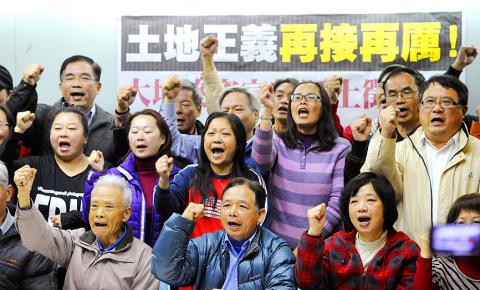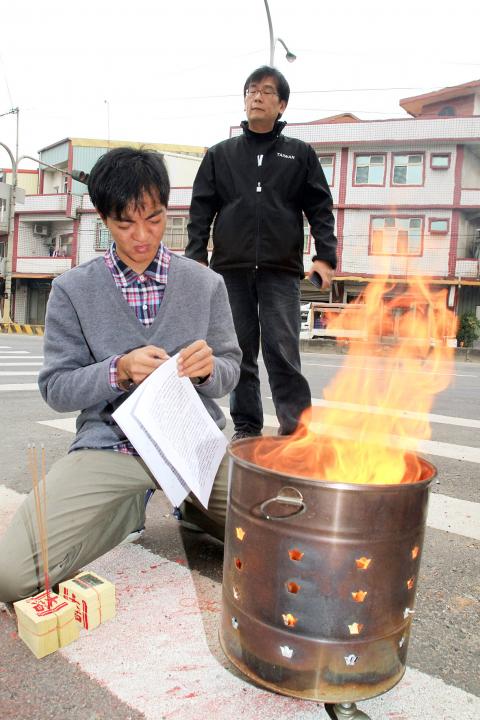Residents of Miaoli County’s Dapu Borough (大埔) erupted in tears yesterday after the Taichung High Administrative Court ruled that the county government had illegally destroyed houses belonging to four families last year.
The court said the Ministry of the Interior had failed to conduct a review of a project submitted by the Miaoli County Government to demolish the private homes in Dapu to make way for a science park before approving the project.
The partial or complete demolition of homes belonging to the Chang (張), Chu (朱), Ko (柯) and Huang (黃) families was therefore unlawful, the court said.

Photo: George Tsorng, Taipei Times
The very emotional Dapu residents and their supporters were quick to demand apologies from the government, reconstruction of their homes and revision of laws governing land expropriation.
“Miaoli County Commissioner Liu Cheng-hung (劉政鴻), as well as every official in the county and central governments who made the decision to flatten our houses, should apologize to us, not only through the media, but by making house-to-house apologies in person,” said Peng Hsiu-chun (彭秀春), the wife of Chang Sen-wen (張森文), who committed suicide last year after their home was demolished.
“Liu should return our land to us and rebuild our homes to their original state, but even that is not enough, because he can never bring my husband back to life,” Peng told a press conference in Taipei.

Photo: Peng Chian-lee, Taipei Times
Huang Chiu-hung (黃秋紅) tearfully recounted how her family suffered over the past few years, and how she has lived in fear that her mother might carry out her comments about committing suicide.
“The county government has destroyed the front yard of our house, and dumped rocks and debris on our farmland. I want it to rebuild everything and restore everything to its original state,” she said.
Ko Chih-chuan (柯智傳) said he appreciated the verdict, but was not happy.
“I feel no joy in winning the lawsuit, because we have a long way to go in our struggle to amend the Land Expropriation Act (土地徵收條例),” Ko said. “If the law is not revised, there will be more tragedies like the one we have suffered. We must stand up against the evil law.”
Even Liao Pen-chuan (廖本全), an associate professor at National Taipei University’s real estate and built environment department, who had appeared so strong in previous public appearances, started to cry as he talked during the press conference.
“It is hard not to be emotional if you have been following the issue for a long time,” he said. “Besides asking the government to restore everything to its original state, we should also pursue efforts to change the system and pursue the county commissioner, the ministry and the Executive Yuan who were responsible [for the destruction].”
Asked if they would seek compensation from the government, Thomas Chan (詹順貴), an attorney representing the residents, said his clients were unlikely to do so unless the money came directly from the pockets of the officials involved.
“If the compensation will come from taxpayers’ pockets, we would rather not ask for it,” he said.
At a separate press conference later in day, Deputy Minister of the Interior Hsiao Chia-chi (蕭家淇) insisted the ministry had conducted thorough reviews of the project numerous times before approving it, “but we would respect the different view of the judge.”
“The fact that the court ruled in favor of nine plaintiffs belonging to four families, but rejected the lawsuit filed by 19 others, shows that overall the project is necessary and beneficial to the public,” Hsiao said.
He said the ministry would wait until it receives the verdict in writing and discusses it with the Miaoli County Government before deciding whether to file an appeal.
Activists demonstrating in the lobby of the ministry said Hsiao was trying to confuse the public.
“The court rejected the other lawsuits not because the judge believed that the project is necessary and beneficial to the public, but, as the court statement indicated, the 19 other plaintiffs agreed to compensation measures proposed by the county government,” Taiwan Rural Front member Lin Le-xin (林樂昕) said.

AIR SUPPORT: The Ministry of National Defense thanked the US for the delivery, adding that it was an indicator of the White House’s commitment to the Taiwan Relations Act Deputy Minister of National Defense Po Horng-huei (柏鴻輝) and Representative to the US Alexander Yui on Friday attended a delivery ceremony for the first of Taiwan’s long-awaited 66 F-16C/D Block 70 jets at a Lockheed Martin Corp factory in Greenville, South Carolina. “We are so proud to be the global home of the F-16 and to support Taiwan’s air defense capabilities,” US Representative William Timmons wrote on X, alongside a photograph of Taiwanese and US officials at the event. The F-16C/D Block 70 jets Taiwan ordered have the same capabilities as aircraft that had been upgraded to F-16Vs. The batch of Lockheed Martin

US President Donald Trump yesterday announced sweeping "reciprocal tariffs" on US trading partners, including a 32 percent tax on goods from Taiwan that is set to take effect on Wednesday. At a Rose Garden event, Trump declared a 10 percent baseline tax on imports from all countries, with the White House saying it would take effect on Saturday. Countries with larger trade surpluses with the US would face higher duties beginning on Wednesday, including Taiwan (32 percent), China (34 percent), Japan (24 percent), South Korea (25 percent), Vietnam (46 percent) and Thailand (36 percent). Canada and Mexico, the two largest US trading

GRIDLOCK: The National Fire Agency’s Special Search and Rescue team is on standby to travel to the countries to help out with the rescue effort A powerful earthquake rocked Myanmar and neighboring Thailand yesterday, killing at least three people in Bangkok and burying dozens when a high-rise building under construction collapsed. Footage shared on social media from Myanmar’s second-largest city showed widespread destruction, raising fears that many were trapped under the rubble or killed. The magnitude 7.7 earthquake, with an epicenter near Mandalay in Myanmar, struck at midday and was followed by a strong magnitude 6.4 aftershock. The extent of death, injury and destruction — especially in Myanmar, which is embroiled in a civil war and where information is tightly controlled at the best of times —

China's military today said it began joint army, navy and rocket force exercises around Taiwan to "serve as a stern warning and powerful deterrent against Taiwanese independence," calling President William Lai (賴清德) a "parasite." The exercises come after Lai called Beijing a "foreign hostile force" last month. More than 10 Chinese military ships approached close to Taiwan's 24 nautical mile (44.4km) contiguous zone this morning and Taiwan sent its own warships to respond, two senior Taiwanese officials said. Taiwan has not yet detected any live fire by the Chinese military so far, one of the officials said. The drills took place after US Secretary